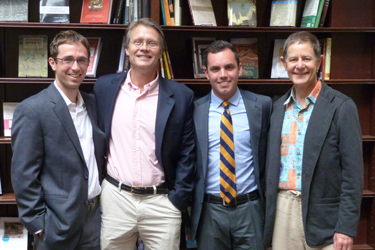Berkeley’s new honor code ‘a living, breathing document’
The UC Berkeley Honor Code is a student-driven document – and, for a large research university, a pioneering one – that grew out of discussions between the ASUC, the Graduate Assembly, the Academic Senate and the deans of the College of Letters and Science, which accounts for more than half of Berkeley's faculty and three in four of its undergrads.
March 18, 2013
Aviv Gilboa, a graduating senior who served last year on the ASUC Senate, is majoring in political economy, and pursuing a certificate in engineering leadership and entrepreneurship. Ask him about the new UC Berkeley Honor Code, though, and he sounds more like a constitutional scholar.

Left to right: Hoople, Richards, Gilboa, Presti (Barry Bergman photo)
“I see it as a living, breathing document,” he says, “something that changes with the times, something that we’re constantly questioning and something that we can continue to learn from as an academic institution.”
Mark Richards, executive dean of the College of Letters and Science, likens the code to “a rhetorical logo – when you see it or read it or hear it, in your mind clicks a whole set of ideas associated with it.”
“It’s not the words themselves, it’s that association with a larger set of ideas,” Richards says. “And if we’re successful, that’s how it will be perceived.”
The UC Berkeley Honor Code, which is being officially unveiled this week, is a student-driven document – and, for a large research university, a pioneering one – that grew out of discussions between the ASUC, the Graduate Assembly, the Academic Senate and the deans of the College of Letters and Science, which accounts for more than half of Berkeley’s faculty and three in four of its undergrads.
Intended to spur what Gilboa calls “an ongoing dialogue” – as opposed to the prescriptive, legalistic Student Code of Conduct – the honor code consists of a single sentence:
“As a member of the UC Berkeley community, I act with honesty, integrity, and respect for others.”
“I don’t know who wrote it,” laughs longtime faculty member David Presti, chair of the Academic Senate’s Student Affairs committee. “It really rose out of this organic process of discussion.”
Gordon Hoople, a grad student in mechanical engineering who took part in that process, says that while student-owned honor codes are familiar at small liberal-arts colleges – such as Harvey Mudd, where he earned his bachelor’s degree – they’re virtually unheard of at large academic institutions. Yet it’s precisely the size and diversity of a place like Berkeley – whether it’s freshmen who haven’t been taught about plagiarism, or students from countries with vastly differing views on the line between collaborating and cheating, for example – that makes it imperative for faculty and students to talk about what’s acceptable and what’s not.
That, adds Gilboa, can differ not just from country to country, but from department to department, class to class and professor to professor.
And then, of course, there’s the Internet.
“To some degree it’s a response to the times,” Richards says of the new code. “The gray areas regarding collaboration, plagiarism, the Internet and so forth are becoming more and more difficult for students and faculty alike to understand. The idea is to create a talking point, or a focus for discussion, in each class among students about academic integrity, because it’s not just black and white all the time.
“So it’s not just that one-sentence honor code,” he says. “The honor code is a mantra, if you will, that will remind people that they need to be thinking about these issues.”
But “it’s the mantra of Berkeley students,” Gilboa stresses, “in that we’re initiating this process.”
“It’s a collaborative effort,” he says, “not one that’s being imposed by the higher echelons of the institution. It’s on the ASUC website. It appears where students go most. And I think that speaks to this notion of student autonomy, which may not be as strong at other large research institutions.”
The hope is that faculty will embrace the new code as a way to stimulate discussions at the beginning of each new class, and – with the help of a series of templates available online – to guide students in their understanding of how they’re expected to handle writing assignments, take-home exams and research projects, including how to cite references and sources.
Beginning next fall, students will be asked to indicate that they agree with the honor code when they accept an offer of admission to Berkeley. The code will be part of the orientation for new students and faculty, and training for graduate-student instructors. Information about it will also be distributed to the entire campus community, including staff.
“These ideas are already deeply embedded in the UC Berkeley community,” observes Presti, a neurobiologist and cognitive scientist. He says they’re similar to – though far pithier than – Berkeley’s “principles of community,” another document meant to guide the ethical behavior of students, faculty and staff.
“As a teacher,” he says, “over the years I’ve found that spending a few minutes talking about these things in the syllabus, and before exams, before assignments are turned in, seems to have a very big effect on decreasing instances of misconduct.
“I’m convinced this will work,” Presti says, “and that it will have a big impact on creating a more consistent dialogue related to issues of integrity and respect in the classroom and everywhere on campus.”
That might seem like a lot to ask of a single sentence. But Gilboa, for one, doesn’t think so.
“The goal is for every member of the UC Berkeley community to ascribe meaning to that one sentence,” he says. “That, hopefully, is going to create the ethos we’re looking for.”
For more, visit the ASUC’s UC Berkeley Honor Code website.